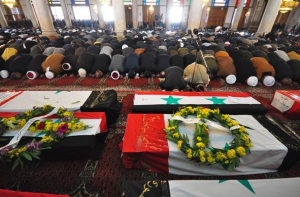By Daniel N.
Regardless of who was responsible, the recent suicide attacks bolster the position of the Assad Dictatorship.
Since the uprising began in March 2011, President Bashar Al Assad has attempted to brand the Syrian opposition as “terrorists” in order to justify his brutal crackdown. The carnage and mass casualties of Friday’s twin suicide bombing attacks may have done just that, throwing the spotlight on the possibility of extremist infiltration into the Syrian opposition.

Friday’s carnage unfolded when at least two explosive-laden vehicles were detonated near security facilities in the heart of the capital. Plumes of smoke could be seen from throughout the capital, while gunfire reportedly rang out amidst the bedlam that followed. Indeed, the perpetrators had managed to smash the relative calm enjoyed by citizens of the Syrian capital, fomenting the kind of chaos more commonly seen in Kabul or Baghdad. Immediately after the explosions, the state media rushed to attribute to the attacks to Al Qaeda-affiliated jihadists, pointing to a recent report that operatives had penetrated its territory through Lebanon.
While the bombings may have succeeded in penetrating the security of the Capital, they could not have come at a better time for the embattled regime. This past week, Assad was left with no choice but to allow Arab League observers into his country as part of an initiative which essentially requires him to pull back his troops from opposition cities. Immediately after the signature, violence intensified across the country, resulting in one of the highest death tolls in the nine-month uprising. The exiled opposition Syrian National Council (SNC) immediately pounced on the opportunity to further pressure the international community to intervene, using the latest violence as an indicator of Assad’s true intentions.
Friday’s bombing attacks however, have put the Syrian opposition on the defensive for the first time since the uprising began, forcing them to attribute the acts to a government conspiracy. The attacks occurred just as Local Coordination Committees geared up for mass demonstrations across the country, acts meant keep the spotlight on Assad’s continued crackdown even after signing the Arab League initiative. In what would have been portrayed by the international media as a day of oppression against a popular movement, Friday’s reporting and commentary shifted to focus on the possibility of Iraq-style sectarian chaos in the advent of Assad’s downfall.
The international community was forced to condemn the attacks, despite continued statements in support of the Arab League initiative. Behind the curtains, analysts and government advisors from Istanbul to Washington DC are no doubt scrambling to assess who was actually responsible for the bombings, and whether or not the Syrian conflict is entering a new phase of sectarian chaos. Until recently, the Syrian conflict was commonly compared to the Libyan revolution, most often during deliberations of international intervention. Such deliberations were based on the assumptions that the Syrian opposition was a popular movement composed of moderate, secular Syrians.
The emergence of an extremist Sunni movement threatens to derail these assumptions, revealing the Syrian reality to be more comparable to the highly volatile conflict in Yemen. Throughout that conflict, the regime of Ali Abdullah Saleh attempted to justify its rule through its role in suppressing Al Qaeda militants who waged an open war against his regime, stealing the spotlight from the nation’s peaceful protest movement. Saleh’s continued airstrikes and military operations indeed discouraged the West from any actions which could expedite the downfall of a regime which proved itself to be the only entity capable of preventing Yemen from becoming a Jihadi safe haven.
The Assad regime and his supporters have continued to capitalize on aftermath of the Damascus bombings. Government officials immediately dismissed the opposition’s claims of conspiracy, citing that such acts bore striking resemblance to Al Qaeda attacks in Iraq and elsewhere. The effects of the bombings have already been utilized by Russia in ongoing Security Council deliberations, who’s delegate stated the preposterous nature of an arms embargo on a regime which was fighting an “extreme opposition.”
While the Syrian opposition’s claims of conspiracy until now have fallen on deaf ears, the Damascus bombings have ironically benefitted the Assad regime to the point where such claims are nearly feasible. Unfortunately for the Syrian opposition, the international community is far more concerned over the proliferation of Islamic extremism as opposed to the plight of a nation living under the whim of a ruthless dictatorship. The Assad dictatorship has long abandoned its efforts of portraying itself as a legitimate regime, instead presenting itself as the lesser of two evils. Assad has continuously called the bluff of the international community by forcing it to choose between his continued rule and the advent of sectarian-fueled chaos in the wake of his ousting.
Regardless of who perpetrated Friday’s attacks, the international community is now forced to carefully reassess its role in expediting the downfall of the Assad Regime, allotting his security-forces much needed time to continue its crackdown. Indeed, a continuation of such attacks threatens to sabotage the peaceful and moderate image in which the Syrian opposition has sacrificed so much to achieve.
What’s next for the Assad Regime? Click here to find out.